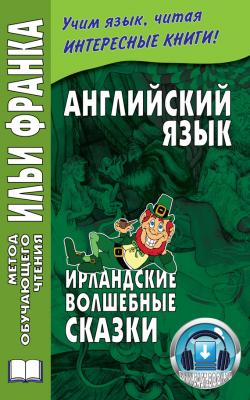ТОП просматриваемых книг сайта:
Английский язык. Ирландские волшебные сказки / Irish Fairy Tales. Отсутствует
Читать онлайн.Название Английский язык. Ирландские волшебные сказки / Irish Fairy Tales
Год выпуска 2013
isbn 978-5-7873-0715-3
Автор произведения Отсутствует
Жанр Иностранные языки
“I have not (у меня /ничего/ нет),” said the king’s son.
“I would,” said the king’s son, “but I have nothing to bet.”
“You have indeed.”
“I have not,” said the king’s son.
“Haven’t you your head (/разве/ у тебя нет головы: «ты не имеешь твою голову»)?” asked the giant of Loch Léin (спросил великан озера Лох Лейна), for it was he (потому что это был /именно/ он) that was in it (кто участвовал в игре: «был в этом»).
“I have (есть: «я имею»),” answered the king’s son (ответил королевский сын).
“So have I my head (также и у меня есть голова: «так я имею мою голову»),” said the giant (сказал великан); “and we’ll play for each other’s heads (и мы будем играть на головы друг друга).”
“I have,” answered the king’s son.
“So have I my head,” said the giant; “and we’ll play for each other’s heads.”
This third time the giant won the game (на этот третий раз великан выиграл игру; time – время; раз, случай; to win /won/ – выигрывать, побеждать); and the king’s son was to give himself up (и королевский сын должен был сдаться: «отдать себя»; to give – давать; to give /gave, given/ up – оставить, отказаться от чего-либо; сдаться и сделаться пленником) in a year and a day (через один год и один день = ровно через год) to the giant in his castle (великану в его замке).
The young man went home sad (молодой человек пошел домой печальным; to go /went, gone/ – идти, ходить) and weary (и уставшим; to wear – носить /одежду/; изнашивать). The king and queen were outside watching (король и королева были на улице, поджидая /его/; outside – снаружи; на улице, вне дома, помещения и т. п.; to watch – наблюдать, следить; поджидать, выжидать, высматривать), and when they saw him approaching (и когда они увидели, что он приближается: «увидели его приближающимся»; to see /saw, seen/ – видеть), they knew great trouble was on him (они поняли, /что/ он попал в большую беду: «они знали, /что/ большая беда была на нем»; to know /knew, known/ – знать; понимать, осознавать; great – большой, огромный, громадный; большой, сильный, колоссальный, огромный /о чувствах, состояниях, свойствах и т. п./; trouble – беспокойство, волнение, тревога; беда, злоключение). When he came to where they were (когда он подошел к /тому месту/, где они были), he wouldn’t speak (он не стал /ничего/ говорить), but went straight into the castle (а пошел прямо в замок), and wouldn’t eat or drink (и не стал ни есть, ни пить: «или пить»).
He was sad and lamenting for a good while (он был печален и грустен довольно долго: «в течение изрядного промежутка времени»; to lament – плакать, оплакивать; горько жаловаться, причитать, стенать; lamenting – печальный, грустный, скорбный; good – хороший; достаточный, обильный, изрядный), till at last he disappeared one day (пока, наконец, он /не/ исчез однажды: «/в/ один день»), the king and queen knew not whither (/а/ король и королева не знали, куда; to know /knew, known/ – знать). After that they didn’t hear of him (после этого они не слышали о нем), – didn’t know was he dead or alive (не знали, был ли он мертв или жив; to die – умирать; dead – мертвый; death – смерть; to live – жить; alive – живой, в живых; life – жизнь).
The young man after he left home (молодой человек, после /того, как/ он оставил дом; to leave /left/ – покидать, оставлять) was walking along over the kingdom (шел вдоль по королевству = бродил по королевству; along – вдоль; по;

